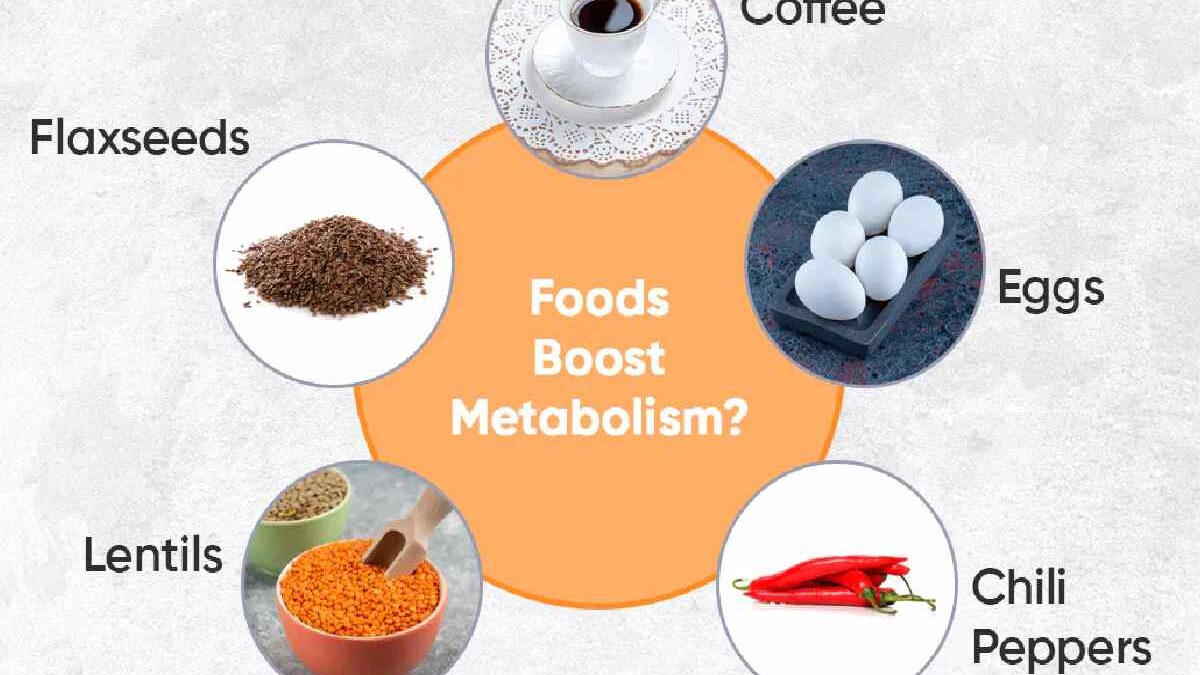Table of Contents
Introduction
Many foods increase metabolism, i.e. interactions that power the body. In this article, we investigate the effects of our diet on metabolism and whether certain foods or drinks have a clear impact on metabolic rates.
Metabolism is a group of interactions within cells to provide the energy needed for different functions such as movement, growth and development.
Many factors affect metabolisms, such as age, diet, sex, physical activity and health status.
The introductory metabolic rate is the energy needed to maintain essential body functions, such as breathing during rest. It is the most significant contributor to daily calorie burning, also called “total energy consumption”.
Digesting and processing food – carbohydrates, proteins and fats – also requires energy, the so-called thermal effect of food. In addition, some foods require more energy to digest slightly more metabolism.
Fats, for example, require less digestion energy than proteins and carbohydrates, with proteins ranked first in terms of thermal effect among essential nutrients.
Do some foods accelerate metabolism?
Specific foods and drinks remain believed to increase our metabolic rate, but this is not necessarily true. Some foods require more energy to digest, and some may increase metabolism slightly.
The most important factor is total food intake, as the thermal effect of food – the energy needed to digest food – varies depending on the nutrients within the meal.
the following are the amounts of energy needed to digest essential nutrients:
proteins: 10-30% of total protein-energy at hand.
Carbohydrates: 5-10% of total carbohydrates consumed.
Fat: 0-3% of total fat intake.
The body consumes the most energy to digest and store proteins, so proteins have the highest thermal effect.
The thermal effect of food accounts for about 10% of total daily energy expenditure, so consuming more protein overall may help burn more calories.
Studies show that eating too many processed foods reduces the energy needed to digest food, reducing fibre and protein content.
Studies show that a high-protein diet increases metabolism and increases calories burned during rest.
A 2015 study of people on a calorie-rich diet found that consuming more proteins increases energy spending during the day than eating little protein.
A 2021 study found that a diet of 40% protein results in more energy existence spent and more fat burning than a 15% protein system. Other studies have shown that high-protein diets increase daily energy expenditure more than low-protein systems.
Do certain foods increase metabolism?
A protein-rich diet helps burn more calories a day, but what about specific foods?
For example, Chilli ingredients, green tea and coffee may increase metabolism slightly.
Caffeine increases energy spending, so eating caffeinated drinks such as coffee and green tea boosts metabolism a little.
Studies have also shown that eating products containing kitchen extract, a component of green tea, increase daily calorie spending to 260 calories if combined with resistance exercises. However, it should remain noted that the study included high doses of green tea extract supplements, so these results may not apply to those who drink green tea.
some studies indicate that the Ebigalocachin Galit compound, found in green tea, increases energy spending when eating 300 milligrams. (green tea contains 71 milligrams of Epiglucachin galette per 100 millilitres.)
Capsaicin, found in chilli peppers, increases metabolism when taking supplements with high concentrations, but eating average amounts in food does not significantly affect metabolism.
Also, a drink containing ginger powder with meals increases the thermal effect of food at a rate of 43 calories per day. However, this does not significantly impact total energy spending or weight loss.
How do we achieve a healthy weight and metabolism?
To maintain a healthy weight, focus on the quality of our diet and its richness in essential nutrients, rather than integrating or removing certain foods from our diet.
Studies indicate that a protein-rich and whole-foods diet increases energy spending compared to a low-protein diet that is highly processed.
You don’t mind consuming moderate amounts of foods and beverages that improve metabolism, such as chilli, ginger and green tea. But don’t expect much impact on energy spending or weight loss.
A balanced diet is rich in fibre and protein. Containing Eggs, vegetables, fruits, nuts, cereals and legumes, achieve healthy metabolism and promotes health.
Physical activity and maintaining muscle mass also help improve total energy spending.
Resistance exercises can be practical, as a 2015 study showed that resistance exercises accelerate rest metabolism by 5% in adults. And a 2020 research found that based on resistance exercises increase the rate of metabolism during rest. The average calorie spend increases to 96 calories per day compared to a reference group.
Conclusion
A balanced diet is preferred, rather than focusing on certain foods. A diet rich in proteins and untreated foods increases energy spending and maintains a healthy weight. Overall, a healthy lifestyle that includes a balanced diet and exercise is the perfect way to achieve healthy metabolism.

